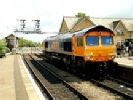Archive Section



John Smith (Managing Director, GBRf)
3rd April 2012
John Smith gave a fascinating insight into the history of the company. Entitled “Turnover is vanity, Profit is sanity”, this gave the 42 members in attendance a chance to discover how one ofthe newer railfreight companies successfully competes against some its more established and much larger competitors.
Now recognised as the third largest rail freight operator in the country, GBRf has come a long way since being formed back in 1999 with just 18 members of staff! To show testament to the values of the company, most are still employed with them today. The company has set out five core values:
- Communication & Visibility = Establishing trust and good working relations with its customers;
- Trust & Empowerment = A two way process with staff to ensure the job gets down.
- Professionalism = A requirement on staff to dress smart and act accordingly. Appearance counts.
- Enjoyment = A vital part of the business. Staff days out, naming locomotives etc,.
- Support = Staff matter to a company like GBRf, so it’s important to look after their welfare with things like healthcare.
It was stressed that the business is not engineering led or operating led! The name of the game is investment: investment in people, equipment and most importantly customers. The largest customer is Drax Power Station. Another successful contract (albeit with a limited timescale) was to remove waste/spoil from the lmberhome Cutting at East Grinstead for the Bluebell Railway. In recognition of the work undertaken, GBRf are running the first passenger train over the newly-
Coal trains to power stations make up a large percentage of the work undertaken. Network Rail ballast and infrastructure work also accounts for a substantial amount too. MSC (the 2“d biggest container shipper in the world) are also an important customer: a contract that was bid for because of the guaranteed volume of freight. A recent contract to deliver brand new tube trains for London Underground has seen the re-
The latest contract awarded was to move waste material away from the Crossrail construction site at Westboume Park, near Paddington. This flow goes to Northfleet where it is put into ships for transfer to a bird sanctuary off the Essex coast.
GBRf are now operating almost 20% of the container trains out of Felixstowe Port. Expansion is desperately needed at the port before any of the three operators (DB, FL or GB) can increase the amount of trains run. Ships today hold nearly twice as much cargo as a decade ago, yet the port infrastructure has not grown at the same rate. Work has now started to address this, with two new berths being opened in 2011 (with further expansion still happening). On the rails, a new double track section across to Ely is being constructed, plus a new North facing chord at Ipswich. Additional capacity on the North London Line is also being planned.
Some of our milestones include winning the Network Rail contracts from DBS (formerly EWS), returning Royal Mail traffic to the rails utilising Class 325 EMU’s (although this has now reverted to DB operation) and Infrastructure trains for Metronet, which required a large investment into the redundant yard at Wellingborough for these trains to operate from/to.
GBRf accounted for 30% of all UK coal trafic last year. However, with coal slowing going out of favour, a new flow of Biomass (from the Gulf of Mexico) is being trialled. This flow arrives into Bristol and is then taken by rail to Drax. Three of these trains compares to just one train of coal -
Freightliner were complacent about others entering the container market. Having inherited all the inland terminals from British Rail, this prevented any other operator from using them. Other such smaller privately-
British Steel was taken over by Corus, who were then succeeded by Tata Steel. ln 20l0 the site at Lackenby was mothballed, with a future of any kind looking unlikely. However, fortunes changed, and a Thai-
Around 50 staff are needed to ensure a smooth operation, although many are new to the industry. GBRf are currently responsible for around 12-
Europorte (the freight sector of Eurotunnel) took over from First Group in 2002 and set up some new intentional flows. including a through service from Domodossola, ltaly to Daventry for DFDS and a train on behalf of Tesco conveying Spanish fruit.
John Smith is keen to influence the debate with the passenger sector that freight is needed on the railways. Not just being the bad-
- flexibility, communication, support etc,
Of the 500+ Class 66’s purchased by various companies in this country, only around 350 are still operating in the UK. The majority of those abroad are now in France or Poland.
There are worries from within GBRf about the future of the locomotive fleet. Locomotive fuel is around 6 litres per mile, equating to l10-
However, the alternatives lack inspiration. The Class 70’s have had a very chequered start to the careers with Freightliner, and for a start they cost over $0.5 million more than a 66. GBRf is always on the hunt for additional locomotives for its fleet -
 GB Railfreight 2001
GB Railfreight 2001
You may also be interested in the lecture Open Access on GB Railfreight, also by John Smith, delivered to the Institution on 04/12/2001